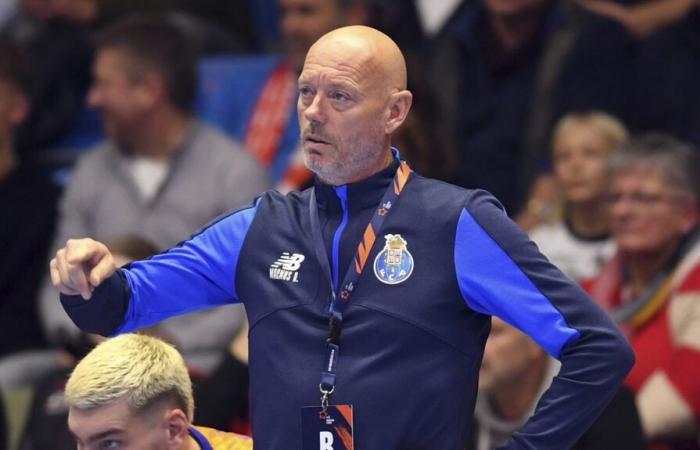Over time, he ditched his short hair and opted for a hairless scalp. But his passion for the game is still the same. Certainly, at 58 years old, Magnus Andersson no longer expresses it on the courts where, with the great Swedish team, he terrorized almost all his opponents at the end of the last century.
Now, the sixth most capped player in the history of his country (310 caps between 1988 and 2003) does so from the bench where he also excels, having won titles with the Swedish juniors (2013 World Cup), Copenhagen (2008 championships). and 2012, 2010 cup), Göppingen (2016 and 2017 EHF cup) and Porto (2019, 2021 and 2022 championship, 2019 and 2021 cup) which he has coached since 2018 with a break last season.
Present once again at the International Handball Meetings of the Pays Châtelleraudais with the Portuguese club, the former best player of the 1993 world championships and the 1994 European championship agreed to look back on his immense career, evoking in particular his legendary coach in the selection , Bengt Johansson, and his principles having greatly influenced him.
Almost thirty years later, do we still talk to you about this golden era when with Sweden you were on all the podiums?
“Yes, that’s still the case, even if it’s not every week anymore. I had a long career with Sweden and we were very successful over many years. Many people were interested in handball then and when we participated in the Olympic Games, the world or European championships, we were on television. People know me for all that but the younger generations a little less so. »
“We became friends for life”
Are you aware of having left your mark on the history of your sport?
“I remember a lot of things and it’s incredible to have been part of this very good team. Now that I am getting older, I am of course very happy to have won these titles but I remember more the trips with the team to many very nice places around the world. With the players, we had very good relationships, we became friends for life. »
What were the keys to Swedish domination in the 1990s?
“We had a generation with Magnus Wislander, Staffan Olsson, Ola Lindgren and we had a coach who knew how to find the keys to train us, being more professional, and who convinced us that we could win. We played together for a long time and at the time the national team meetings lasted longer, which allowed us to have a well-constructed game. »
6
-Like the number of titles won by Magnus Andersson with the great Swedish team. Under the leadership of their legendary coach Bengt Johansson, the Swedes won gold at the 1990 and 1999 World Championships, as well as at the 1994, 1998, 2000 and 2002 European Championships. To these titles are added three medals. silver at the Olympics (1992, 1996, 2000), two at the Worlds (1997, 2001) and two bronze medals at the 1993 and 1995 World Championships.
You mention your national team coach, Bengt Johansson, known for his very innovative management style at the time. How much has he influenced you in your coaching career?
“He was my coach in the national team (1988-2004) but also before, in club, when I arrived at Halmstad in 1987. I spent a lot of time with him and he is extremely important to me in my career but also as a person. He was interested in people, not just sports. He said that to be good on the field, you had to feel good in life. It’s very important to me, in many things. »
After Sweden’s domination, it was France’s turn. How do you explain it?
“We forgot the younger generation because we evolved for many years together, in the same configuration, and when many retired, we did not sufficiently prepare for the future by incorporating one new player per year. We had a hole for several seasons, while France worked very hard and did a huge amount of work in training and renewal. But Sweden is coming back well. »
You have coached in Sweden, Denmark and Germany. Why did you decide to take charge of Porto?
“Throughout my career, I have tried to find my way. I was very lucky because I played in one of the best teams in the world but for me my family is the most important. We have two children and we have always looked for what is best for them. It was more important than being at a prestigious club. In 2018, I was lucky to have this offer from Porto which met our expectations, whether the club, the city or the country. It has become our second home, with interesting sporting results. This is what is most important to me. »
What are your objectives at RIH?
“The most important thing is to face good teams, during a very well organized event. It’s good to be able to play high-level matches during the break. This year, however, we are unlucky since we have four injured while eight players are on selection. We came with a lot of young players, they will be able to gain experience. »



